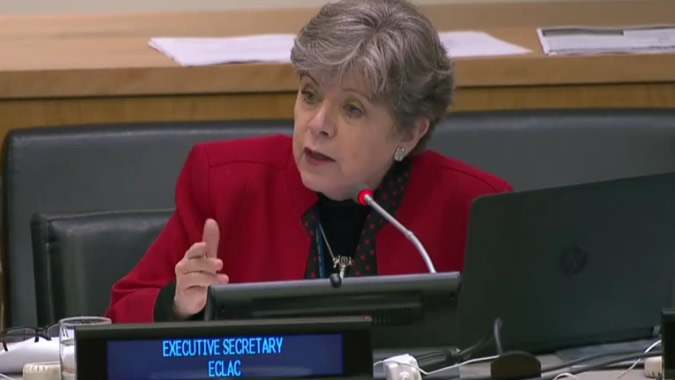We Must Dismantle the Culture of Privilege to Be Able to Finance the 2030 Agenda: Alicia Bárcena
Work area(s)
ECLAC’s Executive Secretary participated in New York in a high-level debate on financing for development with other Executive Secretaries of the UN Regional Commissions.

Financing the 2030 Agenda for Sustainable Development and its 17 goals (SDGs), approved by United Nations Member States in 2015, requires the urgent dismantling of the culture of privilege that still reigns in the region of Latin America and the Caribbean, and which is manifested in current high levels of tax evasion and corruption, Alicia Bárcena, ECLAC’s Executive Secretary, stated today at a high-level event held at UN headquarters in New York.
Bárcena was one of the main speakers at the Dialogue of the Executive Secretaries of the Regional Commissions with the UN General Assembly Second Committee, the topic of which was “Financing for Development: Regional perspectives and the role of the UN Regional Commissions.” The gathering was headed by Sven Jürgenson, Chair of the GA’s Second Committee, and the speakers were Shamshad Akthar, Executive Secretary of the Economic and Social Commission for Asia and the Pacific (ESCAP) and current Coordinator of the UN Regional Commissions; Vera Songwe, Executive Secretary of the Economic Commission for Africa (ECA); Mohamed Ali Alhakim, Executive Secretary of the Economic and Social Commission for Western Asia (ESCWA); Olga Algayerova, Executive Secretary of the Economic Commission for Europe (UNECE); and Alicia Bárcena, Executive Secretary of the Economic Commission for Latin America and the Caribbean (ECLAC).
In her presentation, Alicia Bárcena highlighted that the 2030 Agenda – which is the roadmap that all countries must follow to achieve sustainable development – has ample financing needs that may vary between $3 and $14 billion dollars annually. These resources must be collected in a context dominated by uncertainty, where a crisis of multilateralism, fragmented trade with greater protectionism and an international system with few financial regulations, low taxation levels and weak regulatory institutions may be observed.
“Mobilizing resources for financing the 2030 Agenda will require changing the conversation with the private sector. This also entails combining private and public resources, as well as creating alliances between both sectors to achieve the necessary foundation for maximizing the impact of financing for development,” Bárcena indicated.
The United Nations Under-Secretary-General emphasized that in the region of Latin America and the Caribbean, the culture of privilege is manifested in a high rate of tax evasion and avoidance, which totals 6.7% of the regional Gross Domestic Product (GDP), or roughly $340 billion dollars in 2015. In addition, she explained that ECLAC has presented its own estimates on foreign trade-related illicit financial flows, which amounted to about $31 billion dollars or 0.5 points of GDP (weighted average) in 2013 as a result of price manipulation.
“Effective control of tax evasion and illicit flows requires international cooperation. We have to act collectively, through international agreements and more symmetrical approach,” Alicia Bárcena indicated. “For example, multinational companies must pay their taxes in the country where they obtain their profits.”
ECLAC’s Executive Secretary also highlighted the role of development banks in financing the 2030 Agenda, as well as the need to improve financial inclusion for small and medium-sized enterprises (just 45% of them have access to banking resources) and for women, since only 35% of them participate in the formal financial market in the region.
Alicia Bárcena made special mention of the situation of highly indebted Caribbean countries, which lose many preferences in access to financing because they are considered to be middle-income nations. “For this reason, we at ECLAC have made a debt relief proposal for these countries. We are suggesting implementation of a resilience fund that will allow them to restore and build new infrastructure and access concessional financing, which will help them produce a countercyclical effect to deal with blows such as the natural disasters that have affected them so severely in recent years,” she stated.
“In sum, to implement the 2030 Agenda, we need a national, regional and international governance that allows us to ensure that private flows form part of a financing for development strategy. Likewise, we must consolidate the role of the United Nations Economic and Social Council (ECOSOC) on economic issues and create an intergovernmental body for tax matters and technology transfer,” she said.
During the general debate held at this Dialogue of the Executive Secretaries with the Second Committee, representatives of various nations in attendance expressed their broad support for the work that the five UN Regional Commissions are carrying out with regard to financing for development and vowed to keep promoting the 2030 Agenda. Delegates from the Bahamas, Colombia, Mexico and some countries from Asia and the Middle East voiced special recognition of ECLAC and the leadership of its Executive Secretary for follow-up on the Agenda through the Forum of the Countries of Latin America and the Caribbean on Sustainable Development, the second meeting of which will take place in Mexico in April 2018.
Country(ies)
- Latin America and the Caribbean
Related link(s)
Contact
Public Information Unit
- prensa@cepal.org
- (56 2) 2210 2040